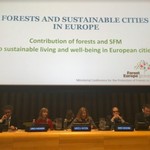FOREST EUROPE Side event at UNFF 13: Forests and Sustainable Cities in Europe
Contribution of forests and SFM to sustainable living and well-being in European cities
Tuesday, 8 May 2018
13:15 – 14:30, Trusteeship chamber
Side event at the 13th Session of the United Nations Forum on Forests
Forests are important ecosystems delivering multiple benefits for the whole society. Through goods and services, they provide, forests also offer manifold opportunities to improve sustainable urbanisation and living in urban areas. Taking into account vast global forest resources, quantity and variability of forest-based products which they provide on one hand, while securing benefits and ecosystem services for the whole environment on the other one, sustainably managed forests are inevitable for sustainable development of our society at the global scale.
Wood, traditionally seen as a main forest product, offers sustainable building material for accelerating urban development. Still, potential of using wood in constructions is not fully exploited, which might be caused by building traditions, but also current legislation and standards. Wood as a construction material has to compete with concrete and steel, materials whose production requires much higher energy inputs thus causing high carbon emissions.
Similarly, many other innovative wood-based products can provide more sustainable alternatives to traditional materials. Wood and wood-based products such as sustainable packaging or textiles made from wooden fibres, can constitute an important part of solution to plastics pollution, landfilling, food security, land degradation or other environmental and social issues linked to unsustainable consumption patterns in our cities.
Moreover, in European urbanized societies, incidences of poor human health have increased especially due to expanding urbanization and modern lifestyles that are related to sedentary work, mental stress and living in smoggy environment. Nervousness, stress and being burn-out as well as associated physical diseases are serious issues of the time we live in. It seems that current health care practices alone cannot solve all these problems. Recently, the potential of forests and green spaces in enhancing human health has been broadly recognized.
The solution to these health problems might be in the natural and forest landscapes, as they are perceived as restorative settings providing endless opportunities for leisure activities, recovery from stress and further social therapeutic intervention.
Forests and green spaces with their positive effects on human mental and physical health and well-being might help in creating healthy living environments in European cities. In this aspect, FOREST EUROPE Work Programme 2016—2020 includes a specific topic centred at benefits and impacts of forests on human health and well-being searching successful examples and concepts of using forests.
Forest policies shall respond accordingly to these global trends, challenges and demographic changesand increase preparedness of the forest sector to meet the needs of the growing urban societies for sustainable renewable products and healthy green environment.Promoting such synergies between cities and forest sector can enable creation of new value chains enhancing competitiveness of the forest sector in the coming decades.
The side event will feature:
The role of forests for cities and urbanized societies in the light of recent policy developments and current FOREST EUROPE Work Programme 2016—2020.
A discussion and sharing experience from European region onhow forests, their products and services contribute to sustainable living and well-being in European cities.
The event will be held in English and is open to all participants who wish to share knowledge or best practices from their countries and thus contribute to the peer learning.
Agenda
Opening
GabrielaMatečná, Minister of Agriculture and Rural Development of the Slovak Republic
Introductory remarks and moderation
ĽudmilaMarušáková, Head of the FOREST EUROPE Liaison Unit Bratislava
Role of forests and green spaces for health and well-being of urbanized societies
Peter Mayer, Federal Research and Training Centre for Forests, Natural Hazards and Landscape, Austria
Katharina Meyer-Schulz, Faculty of Forest Sciences and Forest Ecology, University of Göttingen, Germany
Contribution of wood and other forest products to sustainable living in cities
Harald Aalde, Ministry of Agriculture and Food, Norway
Reima Sutinen, Ministry of Economic Affairs and Employment, Finland
Questions and answers
Closing remarks and conclusions




